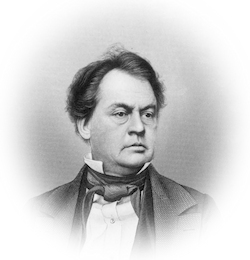Robert Toombs to Alexandr H. Stephens. R.
Washington, D. C, 31st Jany., 1860.
Dear Stephens, … I send you a copy of my speech today. The account in the Union by mistake cutts off a column and a half of it. We have whipped out Sherman and the Helperites. Pennington will be elected today or tomorrow; but he professes to be only a New Jersey opposition man. Seward died hard but he is slain. The common impression here is that my speech did them great harm. It had the tendency to bring us together. Every Southern vote stood together solidly for two days and every Northern Democrat but two stood with them, even on a Southern Whig. Smith declared himself independent of all parties and declared he had never belonged to any party but the old Whig party and bolted that in 1852 on Scott. If we could [get] a fair man for a candidate we could elect him, but the factions here are terrible and destructive. . . .
From Annual Report of the American Historical Association for the Year 1911.
Robert Augustus Toombs was an American lawyer, planter, and politician from Georgia who became one of the organizers of the Confederacy and served as its first Secretary of State. They are looking ahead to the 1860 general election and the likelihood of a “Black Republican” prevailing.
Alexander H. Stephens would later become Vice President of the Confederated States of America
Impending Crisis of the South, by Hinton Rowan Helper, was one of the most sensational books ever published in the United States. Appearing in the spring of 1857 as the nation was sliding toward civil war, the book became the centerpiece of an intense debate on the floor of the U.S. Congress. Helper, an obscure yeoman farmer from North Carolina, claimed that slavery was an economic disaster for the South and an insurmountable barrier to the economic advancement of the region’s slaveless farmers. There was nothing new about this argument. Political economists had long claimed that slavery inhibited economic development and undermined small farmers, craftsmen, and manufacturers. Much of The Impending Crisis was a tedious recitation of dull statistics designed to prove this familiar argument. But Helper also added a shockingly inflammatory threat: If the southern planters did not voluntarily dismantle the slave system, he warned, the small farmers would launch a sustained class war across the South. Helper even hinted at a slave rebellion, although he himself had racist proclivities and little or no sympathy for the plight of the slaves. Coming at such a sensitive moment in national politics, it was no wonder southern leaders denounced Helper’s northern supporters with such vehemence. (Encyclopedia.com)
